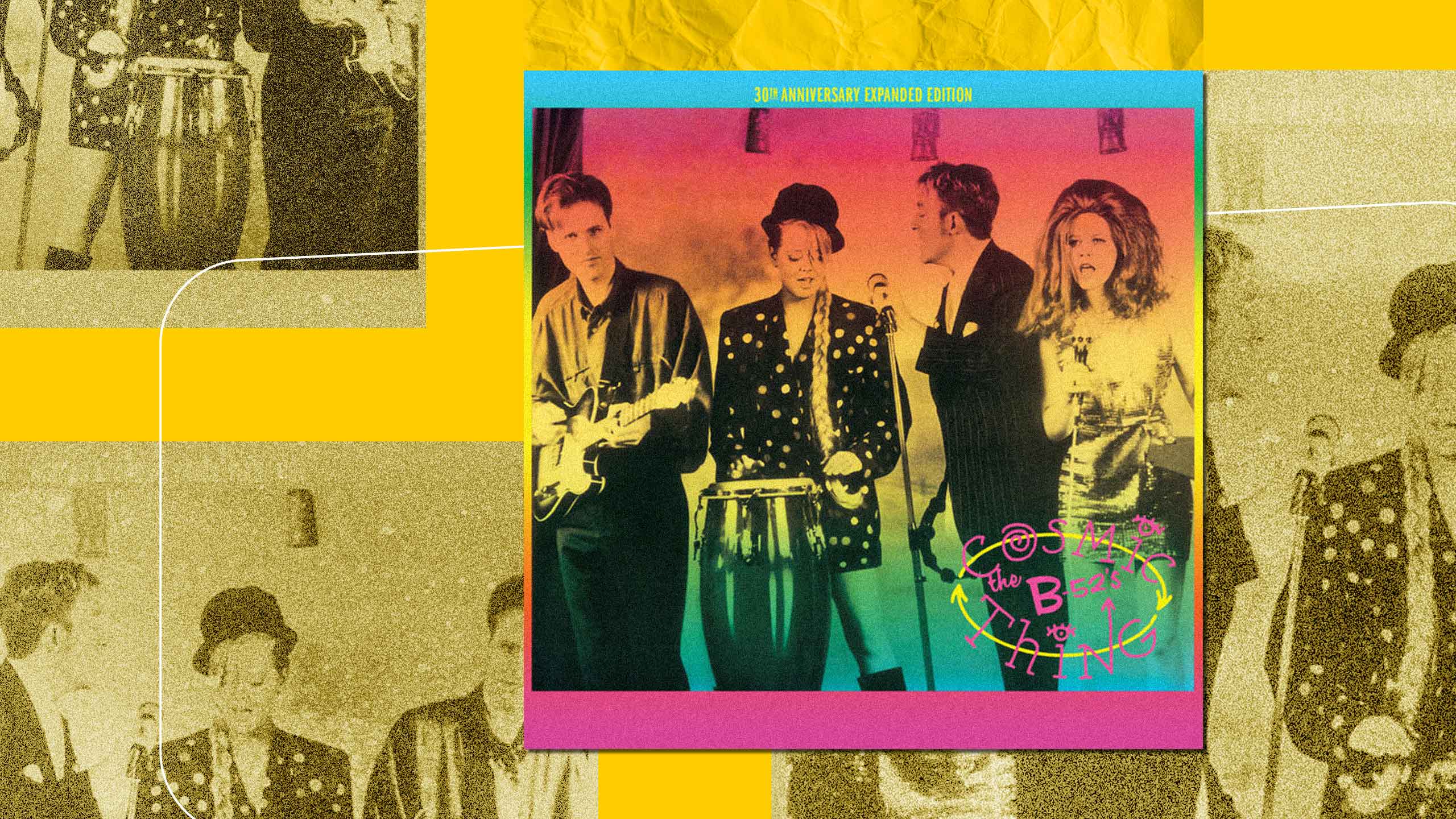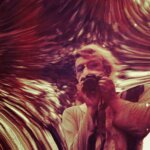If Cosmic Thing hadn’t turned out to be a great record, it would still have an incredible backstory. In 1985, The B-52’s’ guitarist Ricky Wilson died of AIDS, and his grief-stricken bandmates (including his younger sister, Cindy) decided the group should go on what looked to be a permanent hiatus. Drummer Keith Strickland moved out to Woodstock in upstate New York a year later and began writing new songs on guitar, inspired in part by his idyllic, rural surroundings. Slowly but surely, the rest of the band came together and started adding words and melodies to his instrumental sketches, using the project as a way to heal from their loss.
These songs would eventually come to form the backbone of Cosmic Thing, released in 1989—a wildly, improbably successful album that hit the top ten in four countries, spawned two massive international hit singles (“Roam” and the inescapable, indestructible “Love Shack”) and eventually achieved quadruple-platinum status in the U.S. alone. Only a decade earlier, their debut album (and the underground hit “Rock Lobster,” in particular) had established them as one of the oddest bands of the American new wave scene. Now, they were on the cover of Rolling Stone.
Cosmic Thing has no shortage of the band’s trademark goofiness, yet it still reads as an uncharacteristically personal statement. Many reviews point out the undercurrent of melancholy in a song like “Deadbeat Club,” for instance, where the band reminisce over their time as “wild girls and boys” in their hometown of Athens, Georgia. But to read the work as purely personal ignores an even broader context: In 1989, the disease that had claimed Ricky Wilson was still raging across the country with no clear end in sight. At the time, reported cases had climbed to 100,000 in the U.S.
Cosmic Thing isn’t a “political” album per se, but its determined optimism in the face of tragedy can’t help but have a political dimension in that context. “Topaz,” the album’s penultimate track, is a perfect example: Its lyrics describe a paradise on earth where starfish spin and starships blink in the night, but its chorus keeps resolving on an achingly sad B-minor chord. The lyrics tell you what’s to be gained; the music tells you the gravity of what’s been lost. (It’s similar thematic territory to Joe Smooth’s deep house classic “Promised Land” from the following year, where a whomping beat and chorus of “sisters, brothers, we’ll make it to the promised land” can’t quite mask the weary, funereal chord sequence.)
“Being gay was just a part of it,” Strickland would later tell writer T. Cole Rachel. “That’s really how we wanted the world to be, you know? You just do your thing and your sexual orientation is just a part of it. I think it was kind of more revolutionary because of that.”
“This refusal to give up on the idea of a better future in spite of the odds, to create makeshift utopian spaces within a dystopian world is, arguably, a key component of the collective queer identity.”
This refusal to give up on the idea of a better future in spite of the odds, to create makeshift utopian spaces within a dystopian world (what Michel Foucault might call a “heterotopia”—and no, the irony would not have been lost on the French philosopher and historian who died of AIDS in 1984) is, arguably, a key component of the collective queer identity. In his book Cruising Utopia: The Then and There of Queer Futurity, queer theorist José Esteban Muñoz defined queerness as something that does not (or, more to the point, cannot) fully exist within the restrictive parameters of the present, but is rather an “ideality that can be distilled from the past and used to imagine a future.”
As absurd as it may seem to bring up Muñoz and Foucault in relation to an album with “Love Shack” on it, these themes are baked into Cosmic Thing’s very structure. Allmusic’s Stewart Mason is one of the few music critics to really pick up on the album’s conceptual bent, noting that, “Side one of Cosmic Thing covers, more or less, everyday life in the band’s native south. ‘Roam’ kicks off the more metaphysical second side with a spirited call to, for lack of a better term, philosophical quest.” Side one of Cosmic Thing is a history of the band’s formative years in miniature, setting the scene with “Dry County,” introducing our cast of characters in “Deadbeat Club” and showing all the fun and trouble they got up with “Love Shack” and “Junebug.” (Note the latter’s unsubtle implication of a three-girl-and-also-possibly-Fred-Schneider tryst.)
On side two, the band invites us, the listeners, to dream up a better future with them. In that second half, songs like “Roam” and “Follow Your Bliss” radiate determined, hard-earned optimism, while “Channel Z” argues for how urgent change is needed in the here and now, even as they reassure us that “something good is happening!” (A refrain that turns to the more conditional “something good could happen” later in the song; change has begun, but it’s up to us to keep it going.) Even the songs on the album that seem fairly straightforward at first blush are full of subtext. Cindy Wilson has affirmed that the title track is “political,” with the seeming throwaway line “don’t let it rest on the president’s desk” indicating just which “house” they want us to rock (1989 being, of course, the year George H. W. Bush became president).
The band would continue along this path, with mixed results. In 1992, now down to the trio of Kate Pierson, Strickland and Schneider (with Twin Peaks chanteuse Julee Cruise filling in for Wilson on tour), they followed Cosmic Thing up with Good Stuff, a more self-consciously “serious” effort with openly political songs like “Tell It Like It T-I-Is” and “Bad Influence.” Though there was something admirable in seeing the group take a firmer public stand for what they believed in, Cosmic Thing’s more subtle, subversive stance has ultimately helped it age better in the long run. The subtext and thematic richness is there if you want to dive in, but you can just as easily put that aside and take it as a great party record, which is neither an accident nor a strike against it.
So much of the most vital queer community-building is done in bars, in clubs and on dancefloors, in places where people get together to flirt and have fun and escape or crappy, hole-in-the-wall dives that become queer hubs out of sheer necessity. There’s a certain painful irony in listening to an album like Cosmic Thing now, when we are physically unable to come together in these spaces to mourn and celebrate those we’ve lost individually and collectively. At the same time, Cosmic Thing exists now, just as it did then, to keep us focused on the good times to come—and to remind us that good times are coming in the first place. Something good could happen, something big and lovely.


 Why you can trust Xtra
Why you can trust Xtra


